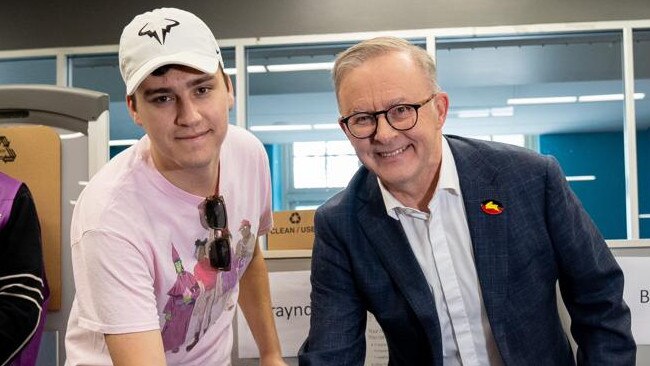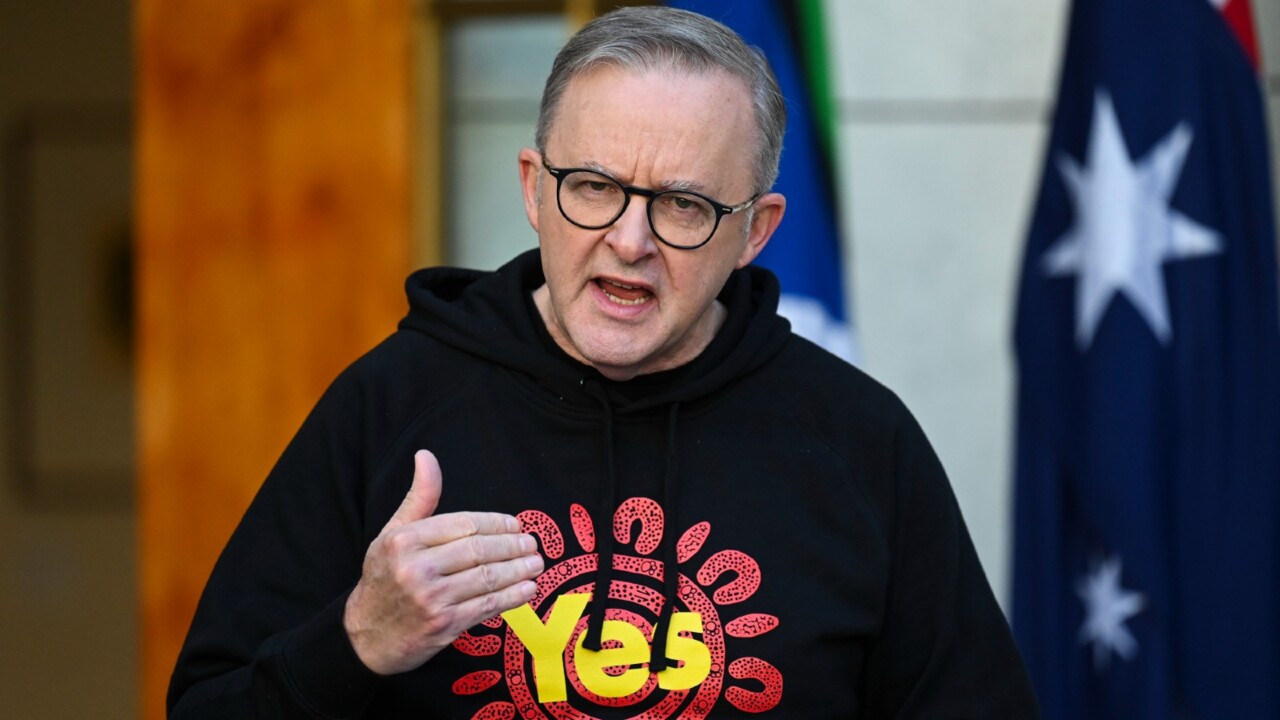Labor’s stocks fall, support for the Indigenous voice to parliament hits new low: Newspoll
Approval for the referendum question is now at the lowest ebb since it was first proposed as Anthony Albanese and Labor also hit a post-election nadir.

Support for the Indigenous voice to parliament and executive government has weakened further heading into the final week of the campaign, with just a third of voters now backing the proposed constitutional change amid a critical loss of support among younger voters.
The Albanese government has also suffered electorally, with Labor’s primary vote slipping to its lowest level since the election and Anthony Albanese’s personal approval rating dipping to a new low as his lead over Liberal leader Peter Dutton narrows to its tightest margin.
An exclusive Newspoll conducted for The Australian shows support for the voice falling a further two points in the past fortnight to 34 per cent as Australians prepare to cast their vote this coming weekend.
Approval for the referendum question is now at the lowest ebb since it was first proposed.
The no vote has risen two points to 58 per cent, with 8 per cent of voters saying they still didn’t know which way they would vote. With the “don’t know” category removed the split becomes 37/63 in favour of a no vote.
The Prime Minister yesterday remained optimistic that a large proportion of Australians may still be undecided and swing in favour of the voice on polling day.
But in a troubling trend for the Yes campaign, support among younger voters has also fallen below 50 per cent with the no vote for the first time now ahead of the yes vote among a key group that the Yes campaign has been heavily relying on to deliver a victory.
The number of 18 to 34 year-olds saying they intended to vote no rose eight percentage points to 49 per cent. The yes vote declined four points to 46 per cent, while the number of those saying they didn’t know almost doubled from 5 per cent to 9 per cent.
This represents a decline of almost 10 points among this critical voting group since the start of the official referendum campaign.
There is now not a single demographic category in which the yes vote outnumbers the no case. Less than a quarter of voters aged over 65 said they would vote yes – 24 per cent – and only slightly over a quarter – 26 per cent – of 50 to 64 year-olds were in favour.
The only demographic which improved for the yes vote was among the 35 to 49 year-olds where support lifted a point to 37 per cent. However, the no vote still remained stronger at 53 per cent.

Among the sharpest decline in support was among Labor voters, with those saying they intended to vote yes also falling below 50 per cent for the first time. The no vote rose six points to 42 per cent while the yes vote dropped six points to 48 per cent.
The latest Newspoll survey of 1225 voters nationally, taken between October 3 and October 6 – a two-week gap since the previous poll – shows a concurrent decline in support for the government and Mr Albanese, with cost-of-living pressures also showing no sign of easing.
Labor’s primary vote fell a point to 34 per cent – its lowest level since the election result, which delivered it victory on a primary vote of 32.6 per cent. It is now four points down since mid-June.
Mr Albanese has also suffered a decline in personal support, with his approval rating dipping back into negative territory for the second time. Satisfaction with his performance dropped two points to 45 per cent – the lowest level recorded for Mr Albanese since becoming prime minister.
Those dissatisfied with the job he was doing as leader rose two points to 46 per cent, delivering a net negative satisfaction rating of minus one.
The Coalition’s primary vote was unchanged at 36 per cent which remains consistent with its election result but is five points up on its lowest level recorded in this electoral cycle.
However, the gap has narrowed in the head-to-head contest between the two rivals, with Mr Albanese’s lead reducing to the tightest margin since the election at 17 points.
Mr Dutton approval ratings recovered from a record low in the last survey, rising five points to 37 per cent with a two-point fall in those dissatisfied with him to 50 per cent. He remains firmly in negative territory on minus 13.
The Greens primary vote lifted a point to 12 per cent in line with its election result. Pauline Hanson’s One Nation fell a point to 5 per cent while other minor parties and independents lifted two points to 13 per cent. This was still down, however, on the 14.5 per cent of the vote secured among this group at the last election.
University-educated voters, who had until now been strongly in favour of the voice, were now also for the first time more likely to vote no, with a nine-point decline in support to 45 per cent. The no vote in this demographic lifted from 40 per cent in the last survey to 49 per cent in the latest.
The divide between metropolitan and regional voters also narrowed significantly, with 31 per cent of country voters backing the voice compared to 35 per cent of city voters.
There was no change in support among female voters at 36 per cent, although no voters dropped three points to 54 per cent, with a corresponding rise in those who didn’t know to 10 per cent.
Support among male voters, however, dropped five points to 31 per cent.








To join the conversation, please log in. Don't have an account? Register
Join the conversation, you are commenting as Logout